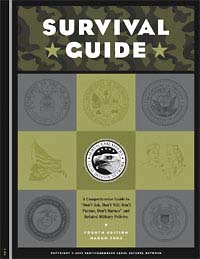|
Revised 'Survival Guide' for Military Personnel Released
Compiled by GayToday
Servicemembers Legal Defense Network
 Washington, D.C.- Servicemembers Legal Defense Network (SLDN) has released an updated edition of its Survival Guide, a comprehensive legal guide about the military's "Don't Ask, Don't Tell" law. The guide answers frequently asked questions about the military's gay ban, including information on coming out, reporting harassment, investigations and discharge. The revised guide also includes information for HIV-positive and transgender military personnel as well as information on veterans' benefits. Washington, D.C.- Servicemembers Legal Defense Network (SLDN) has released an updated edition of its Survival Guide, a comprehensive legal guide about the military's "Don't Ask, Don't Tell" law. The guide answers frequently asked questions about the military's gay ban, including information on coming out, reporting harassment, investigations and discharge. The revised guide also includes information for HIV-positive and transgender military personnel as well as information on veterans' benefits.
"The 'Survival Guide' is the only publication that explains the military's gay ban in simple, straight-forward terms," said SLDN Executive Director C. Dixon Osburn. "Since its original publication, the guide has been relied upon by service members, commanders and attorneys working with 'Don't Ask, Don't Tell.' This new edition contains important guidance for service members, including new information reflecting anti-harassment programs SLDN helped to usher in at the Department of Defense.'"
SLDN cautioned, however, that the guide should not be used as a substitute for legal advice from an attorney. "Any service member targeted under 'Don't Ask, Don't Tell,' or who is considering coming out or reporting harassment to their command should contact SLDN for legal counsel specific to the circumstances of their case," said Osburn. "While the Survival Guide includes basic information about the military's policies, each service member's case is unique."
Among the guide's updated advice:
A new section on issues impacting transgender service members notes that, "Service members who seek psychological or medical treatment through the military should know that conversations with military health-care providers are not confidential and any statement concerning being transgender can, and most likely will, be reported to their commands and separation proceedings begun. For those members who seek treatment from civilian providers, beware that each service has regulations governing military members seeking outside health care and may include reporting requirements. Failure to abide by these regulations could potentially place a member at risk for UCMJ action. Further, cross-dressing as part of the transition process, even when prescribed by competent medical providers, may be considered a violation of the UCMJ and can potentially be prosecuted at court-martial."
The guide advises veterans who may be interested in becoming more active in the fight to repeal the military's gay ban that, "A veteran's sexual orientation should have no bearing on a veteran's eligibility for VA benefits. Lesbian, gay, bisexual and transgender veterans should be clear that the Department of Defense and the Department of Veterans Affairs (VA) are separate federal agencies. "Don't Ask, Don't Tell, Don't Pursue, Don't Harass" does not apply to VA. Lesbian, gay, bisexual and transgender veterans interested in obtaining more information regarding their eligibility for VA benefits should contact the Department of Veterans Affairs or their states' office dealing with veterans' affairs."
Regarding HIV-positive military personnel, the Survival Guide notes that, "HIV+ members face problems in four broad - and overlapping - areas: (1) sexual contact tracing; (2) confidentiality; (3) promotion eligibility; and (4) harassment," and goes on to give information on each area.
The new edition also includes advice on "Don't Ask, Don't Tell" during times of war. "During a military mobilization, service members who make a statement about their sexual orientation, regardless of the reason for making a statement about sexual orientation - including harassment, threat, integrity or other reason - should not expect the command to immediately initiate the discharge process. Commanders are focused on the mission and not on discharging valued team members," the guide says. "Veterans who are interested in rejoining the military during a time of war should check their discharge paperwork. Veterans who have been discharged under the "Don't Ask, Don't Tell, Don't Pursue, Don't Harass" policy will probably not be able to rejoin."
Copies of the guide are available for download at www.sldn.org,
or by emailing legal@sldn.org. Service members may also contact SLDN for
free, confidential legal counseling by calling (202) 328-FAIR or emailing
legal@sldn.org. |
|
|

 Washington, D.C.- Servicemembers Legal Defense Network (SLDN) has released an updated edition of its Survival Guide, a comprehensive legal guide about the military's "Don't Ask, Don't Tell" law. The guide answers frequently asked questions about the military's gay ban, including information on coming out, reporting harassment, investigations and discharge. The revised guide also includes information for HIV-positive and transgender military personnel as well as information on veterans' benefits.
Washington, D.C.- Servicemembers Legal Defense Network (SLDN) has released an updated edition of its Survival Guide, a comprehensive legal guide about the military's "Don't Ask, Don't Tell" law. The guide answers frequently asked questions about the military's gay ban, including information on coming out, reporting harassment, investigations and discharge. The revised guide also includes information for HIV-positive and transgender military personnel as well as information on veterans' benefits.